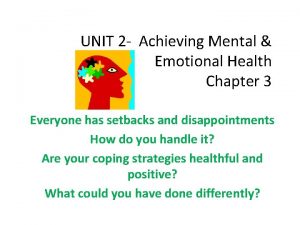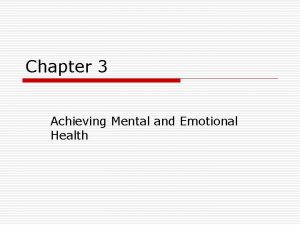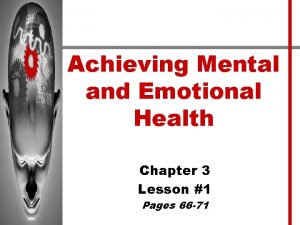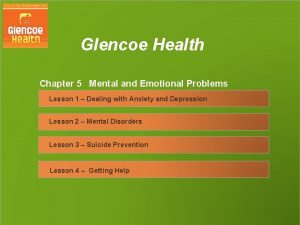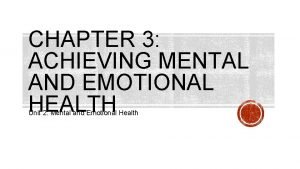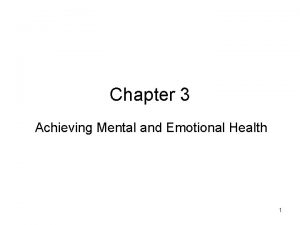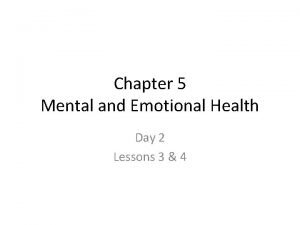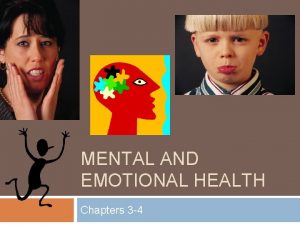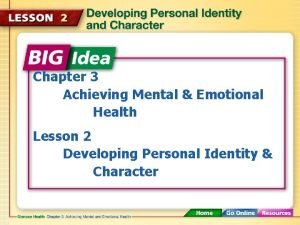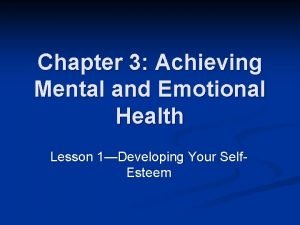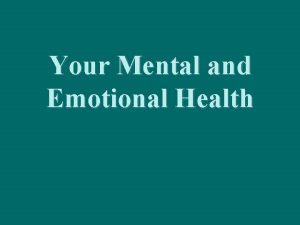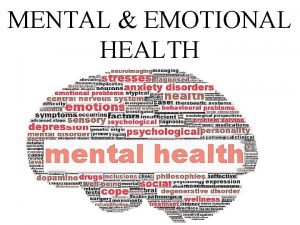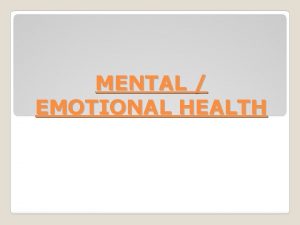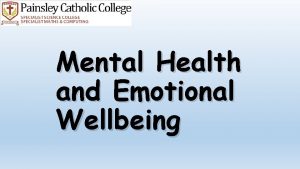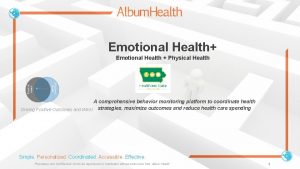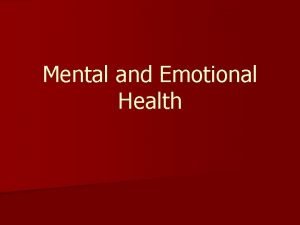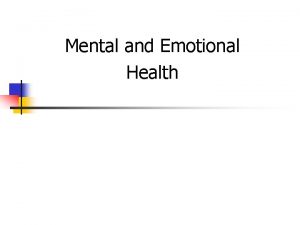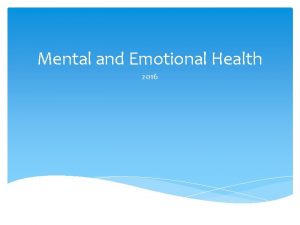Chapter 8 Your Mental and Emotional Health Mental













- Slides: 13

Chapter 8 Your Mental and Emotional Health • Mental Health-having a positive outlook, being comfortable with yourself and others, and being able to meet life’s demands.

Signs of Good Mental Health In general people with good mental health: ü Are realistic about their strengths and weaknesses. ü Are responsible for their personal behavior ü Avoid high-risk behaviors such as using alcohol, tobacco, or other drugs ü Are open minded and flexible ü Are fun-loving and able to relax alone or with others ü Respect both their own and others’ needs

ü Respect everyone’s value as a human being—including their own ü Express their emotions in ways that do not hurt themselves or others ü Invest time and energy into nourishing relationships ü Put their talents and abilities to good use ü View change as a challenge and an opportunity

Self-Esteem • The confidence and worth that you feel about yourself is directly related to your general level of wellness. • Teens with high self-esteem are better able to take failure in stride and move forward. • Having high self-esteem promotes good mental health

The Role of Positive and Negative Feedback • Feedback-messages from others that indicate who they think you are or what they think you are like. • A person who has received mostly positive feedback will generally have high self-esteem. • Someone who has received lots of negative feedback may be more likely to have low selfesteem and fragile mental health.

Maslow’s Hierarchy of Needs • A ranked list of those needs essential to human growth and development presented in ascending order from the most basic to the most full-filling or satisfying.


Physical Needs • The need to satisfy hunger, thirst, sleep, breathing, homeostasis, etc. • A lack of essential nutrients the body needs also interferes with the normal functioning of the brain, which in turn affects a person’s mental health. • Many of you take for granted these needs, but there are great numbers of people for whom food, clean water, and shelter are scarce or unavailable.

Safety needs • • Personal security from crime Financial security Health and well-being Safety net against accidents/illness and the adverse impacts

Social needs • involves emotionally-based relationships in general, such as: • friendship • intimacy • having a supportive and communicative family

Esteem • All humans have a need to be respected, to have self-esteem, self-respect, and to respect others. • People need to engage themselves to gain recognition and have an activity or activities that give the person a sense of contribution, to feel accepted and selfvalued, be it in a profession or hobby.

Aesthetic needs • The motivation to realize one's own maximum potential. • The need for self-actualization is the final need that manifests when lower level needs have been satisfied.

 The intentional use of unfriendly or offensive behavior
The intentional use of unfriendly or offensive behavior Chapter 3 achieving mental and emotional health
Chapter 3 achieving mental and emotional health Chapter 3 lesson 2 health
Chapter 3 lesson 2 health Chapter 5 glencoe health answers
Chapter 5 glencoe health answers Chapter 15 achieving mental and emotional health answer key
Chapter 15 achieving mental and emotional health answer key Chapter 3 achieving mental and emotional health
Chapter 3 achieving mental and emotional health Emotional health defintion
Emotional health defintion Achieving mental and emotional health
Achieving mental and emotional health Chapter 3 mental and emotional health
Chapter 3 mental and emotional health Chapter 3 achieving mental and emotional health
Chapter 3 achieving mental and emotional health Chapter 3 achieving mental and emotional health
Chapter 3 achieving mental and emotional health Chapter 3 lesson 2 health
Chapter 3 lesson 2 health Chapter 3 achieving mental and emotional health
Chapter 3 achieving mental and emotional health Chapter 15 achieving mental and emotional health
Chapter 15 achieving mental and emotional health
